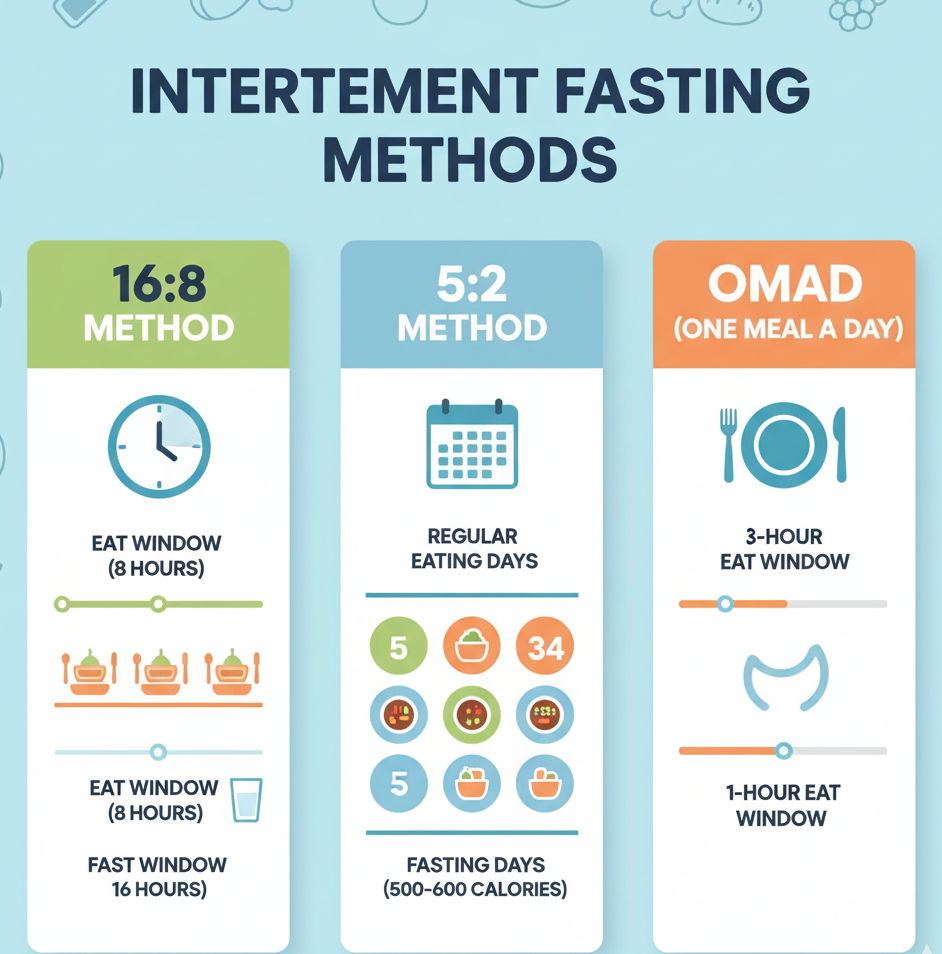Introduction
Intermittent fasting (IF) has become one of the most popular global health trends, widely adopted in India for weight management, metabolic health, and longevity. But as more people embrace fasting patterns such as 16:8 or 5:2, an important question arises — does intermittent fasting impair thinking and cognitive function?
A recent international study published in the Journal of Nutrition and Neuroscience sheds new light on this debate. Contrary to fears that fasting may reduce concentration or slow reaction time, researchers found no long-term negative effects on cognition — and in some cases, fasting may even improve mental clarity when done correctly.
This Quickobook blog breaks down the science behind intermittent fasting, how it affects brain function, and what the new study means for your health and productivity.
Overview: What Is Intermittent Fasting?
Intermittent fasting is an eating pattern that alternates between periods of fasting and eating. Unlike traditional diets that focus on what you eat, intermittent fasting focuses on when you eat.
Common Methods:
-
16:8 Method: Fast for 16 hours, eat during an 8-hour window.
-
5:2 Method: Eat normally for 5 days, restrict calories (500–600) for 2 days.
-
Alternate-Day Fasting: Fast every other day.
-
OMAD (One Meal A Day): Eat only one large meal daily.
In India, many people naturally follow fasting traditions through Navratri, Ekadashi, Ramadan, or religious observances, making intermittent fasting a culturally familiar concept.
The Brain–Fasting Connection
The human brain is energy-hungry, consuming nearly 20% of the body’s glucose. During fasting, glucose availability drops, prompting the body to switch to ketones — molecules produced from fat breakdown — as an alternate fuel source.
Ketones are not just energy substitutes; they have neuroprotective and anti-inflammatory effects. This switch can enhance mental clarity and promote better brain resilience.
Key Biological Mechanisms:
-
Increased Brain-Derived Neurotrophic Factor (BDNF): Supports neuron growth and improves memory.
-
Reduced Oxidative Stress: Lowers brain inflammation linked to aging.
-
Improved Insulin Sensitivity: Stabilises energy supply to the brain.
-
Enhanced Autophagy: Removes damaged brain cells, supporting cognitive longevity.
The New Study: What Researchers Found
The recent multi-centre study, conducted by researchers from Harvard Medical School and the National Institute of Nutrition (India), analysed over 1,200 participants who practiced intermittent fasting for 3–12 months.
Major Findings:
-
No Cognitive Decline: Fasting did not reduce attention span, memory recall, or reaction time.
-
Improved Focus: Participants reported better mental clarity after adapting to fasting for 2–4 weeks.
-
Mood Stability: Initial irritability during fasting hours improved over time as energy balance stabilised.
-
Enhanced Neuroplasticity: Blood markers showed higher BDNF levels, promoting new neural connections.
-
Slight Learning Curve: Early phases (first week) showed mild fatigue or distractibility in some participants.
The study concluded that intermittent fasting, when balanced and hydrated, does not impair cognitive function and may actually enhance brain performance — especially in overweight or prediabetic individuals.
Common Myths About Fasting and Brain Function
Myth 1: Fasting starves the brain.
Fact: The brain efficiently adapts to using ketones for energy. In fact, ketones may fuel neurons more efficiently than glucose.
Myth 2: Skipping breakfast reduces focus.
Fact: While breakfast can aid productivity for some, skipping it occasionally doesn’t harm brain function once your body adjusts.
Myth 3: You can’t think clearly while fasting.
Fact: Many participants report improved alertness after the initial adjustment period, due to stable energy from fat metabolism.
Myth 4: Fasting increases stress hormones and brain fog.
Fact: Short-term fasting can actually lower cortisol and reduce inflammation once the body adapts.
Potential Benefits of Intermittent Fasting for Brain Health
-
Improved Memory and Learning: Fasting enhances BDNF and promotes synaptic plasticity.
-
Neuroprotection Against Diseases: May lower risk of Alzheimer’s and Parkinson’s disease.
-
Increased Mental Clarity: Stable energy levels reduce afternoon fatigue or post-meal sluggishness.
-
Better Mood Regulation: Balanced neurotransmitters improve emotional resilience.
-
Reduced Brain Inflammation: Fasting reduces inflammatory markers linked to neurodegeneration.
Possible Drawbacks or Risks
While intermittent fasting has potential benefits, it may not suit everyone. The study noted temporary cognitive dips in the first few days of fasting, especially if individuals skipped hydration or reduced sleep.
Risks to Consider:
-
Early Fatigue: As the body transitions from glucose to ketones.
-
Low Blood Sugar Episodes: Especially in diabetics or those on medication.
-
Dehydration: Can cause dizziness or headache affecting concentration.
-
Nutrient Deficiency: If fasting leads to poor diet quality in eating windows.
-
Sleep Disruption: Late-night eating or long fasting windows may affect rest cycles.
Doctors advise consulting a healthcare professional before starting fasting, especially for those with diabetes, thyroid disorders, or low BMI.
Intermittent Fasting and Indian Diet Patterns
In India, fasting isn’t new — it’s a centuries-old cultural and religious practice. However, modern intermittent fasting often combines traditional eating with scientific timing.
Indian-friendly IF options:
-
16:8 with Indian foods: Break fast with buttermilk, fruits, dal, and sabzi instead of high-sugar snacks.
-
Plant-based fasting: Lentils, millets, and ghee can provide satiety and energy.
-
Coconut water and lemon water: Maintain hydration and electrolyte balance during fasts.
-
Avoid deep-fried fasting foods: Common mistake during Navratri or Ekadashi.
Blending modern science with Indian dietary wisdom can make fasting safe, sustainable, and mentally energising.
ALSO READ: How To Manage Stress And Anxiety: A Complete Guide For Mental Health
Intermittent Fasting for Different Age Groups
Young Adults (20–40 years):
Often experience improved focus and productivity, especially during morning work hours.
Middle-aged Adults (40–60 years):
May see metabolic benefits, but must avoid excessive fasting that causes fatigue or mood swings.
Older Adults (60+ years):
Fasting should be shorter or supervised. Ensure adequate protein and hydration to prevent brain fog or weakness.
How to Fast Without Affecting Brain Function
-
Stay Hydrated: Drink water, herbal tea, or coconut water.
-
Break Fast Smartly: Include proteins and healthy fats (e.g., eggs, paneer, nuts).
-
Avoid Overeating: Sudden heavy meals post-fast can cause sluggishness.
-
Sleep Well: Poor sleep reduces mental clarity regardless of fasting.
-
Ease Into It: Start with 12:12 fasting and gradually move to 16:8.
When to Stop or Seek Medical Advice
Stop fasting and consult your doctor if you experience:
-
Dizziness or fainting spells
-
Prolonged confusion or difficulty concentrating
-
Severe headaches or dehydration
-
Sudden drop in blood pressure
-
Extreme fatigue affecting daily activities
Quickobook recommends speaking with a nutritionist or internal medicine specialist to create a personalised fasting plan that supports both physical and cognitive health.
Conclusion
The new study offers reassurance — intermittent fasting does not impair brain function when done responsibly. Instead, it may improve focus, protect against age-related decline, and enhance long-term brain resilience.
For Indian audiences, combining intermittent fasting with balanced traditional foods, proper hydration, and rest can help you experience mental clarity and improved overall well-being.
In short — fast smart, not hard.
Quickobook Call to Action
Thinking about starting intermittent fasting?
Book a consultation with a nutritionist or general physician on Quickobook.com for safe, personalised guidance.
Stay informed, stay healthy, and make every meal — and every fast — count.
Disclaimer
This blog is for educational purposes only. It does not substitute professional medical advice. Always consult your doctor before making dietary or lifestyle changes.
50 FAQs About Intermittent Fasting and Cognitive Health
Q1. Does intermittent fasting affect brain performance?
No, studies show it maintains or even improves focus and mental clarity.
Q2. Can fasting cause brain fog?
Only temporarily during adaptation; hydration and electrolytes help prevent it.
Q3. Does skipping breakfast affect memory?
Not significantly. Your brain adjusts to energy from fat and ketones.
Q4. How does fasting improve brain health?
It increases BDNF, reduces inflammation, and promotes new neural connections.
Q5. Is intermittent fasting safe for students?
Yes, if calorie needs are met and hydration is maintained.
Q6. Can fasting help prevent Alzheimer’s?
Research suggests fasting may delay neurodegeneration.
Q7. Does fasting improve focus?
Yes, many report better focus after adapting to fasting cycles.
Q8. How long does it take for the brain to adapt?
Usually 1–2 weeks for energy balance to stabilise.
Q9. Can fasting cause headaches?
Yes, often from dehydration — drink water and avoid caffeine excess.
Q10. Does fasting affect mood?
Initial irritability may occur but stabilises as the body adjusts.
Q11. Should I drink coffee while fasting?
Yes, black coffee is fine; avoid sugar and milk.
Q12. Does fasting affect sleep?
Late meals or long fasting can affect sleep; maintain regular timing.
Q13. Can fasting reduce anxiety?
Some studies show reduced cortisol and improved emotional stability.
Q14. Can intermittent fasting cause fatigue?
Only in the initial phase or if nutrition is inadequate.
Q15. Is intermittent fasting safe for women?
Yes, but hormonal balance must be monitored. Consult a doctor.
Q16. Does fasting help ADHD or focus disorders?
More research is needed, but stable glucose may help focus.
Q17. Can children try intermittent fasting?
Not recommended without medical supervision.
Q18. Does fasting improve memory?
Yes, via increased BDNF and reduced oxidative stress.
Q19. Is intermittent fasting safe with exercise?
Yes, but pre- and post-workout nutrition must be planned.
Q20. Can fasting cause dizziness?
Yes, especially if skipping hydration or salt.
Q21. Does fasting increase intelligence?
Not directly, but it supports cognitive efficiency.
Q22. Can fasting affect concentration at work?
Short-term adjustment may reduce focus; long-term improves it.
Q23. Is intermittent fasting suitable for diabetic patients?
Only under doctor supervision.
Q24. Does fasting affect blood pressure?
It may lower it mildly due to weight loss and improved heart health.
Q25. Can fasting increase productivity?
Yes, due to reduced post-meal sluggishness.
Q26. Should you take supplements during fasting?
Only if prescribed; some vitamins need food for absorption.
Q27. Does fasting cause depression?
No evidence; moderate fasting may improve mood balance.
Q28. Can fasting cause dehydration?
Yes, if fluids aren’t consumed adequately.
Q29. How long can you fast safely?
Most people do well on 12–16 hours; longer fasts need supervision.
Q30. Is intermittent fasting better than calorie restriction?
It’s easier to maintain and improves metabolism naturally.
Q31. Does fasting cause nutrient deficiency?
Only if food quality is poor during eating windows.
Q32. How to avoid brain fog while fasting?
Stay hydrated and break fast with balanced meals.
Q33. Can fasting affect thyroid function?
Usually safe, but consult a doctor if on medication.
Q34. Can fasting improve gut health?
Yes, by allowing digestive rest and microbial balance.
Q35. Does fasting help in weight loss without harming the brain?
Yes, when properly managed.
Q36. Can fasting reduce inflammation in the brain?
Yes, it lowers inflammatory cytokines.
Q37. Can fasting boost creativity?
Some report enhanced clarity and idea flow during fasting.
Q38. Should pregnant women fast?
Not recommended without medical advice.
Q39. How long should beginners fast?
Start with 12 hours and progress gradually.
Q40. Does fasting affect metabolism?
It may slow slightly at first, then stabilises with adaptation.
Q41. Can fasting trigger migraines?
Sometimes, if hydration or caffeine intake is unbalanced.
Q42. Is intermittent fasting a trend or science?
Both — but evidence supports many of its benefits.
Q43. Can fasting reverse brain aging?
It may delay cognitive decline through cellular repair.
Q44. Does fasting affect hormones?
Yes, positively balances insulin and leptin in most adults.
Q45. What to eat after fasting for brain health?
Eggs, nuts, whole grains, and fruits — avoid heavy fried foods.
Q46. Can fasting help improve exam performance?
Indirectly — by improving focus and sleep quality.
Q47. Does fasting affect serotonin or dopamine?
Yes, it can enhance neurotransmitter balance naturally.
Q48. Is fasting safe for people on antidepressants?
Consult your psychiatrist first.
Q49. How can Quickobook help?
Quickobook connects you to nutritionists who personalise safe fasting plans.
Q50. What’s the final takeaway?
Intermittent fasting, when done safely, enhances both physical and mental well-being — not the opposite.












Comments (0)
No comments yet. Be the first to share your thoughts!
Leave a Comment